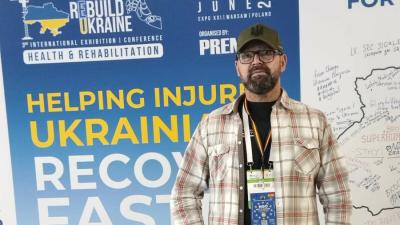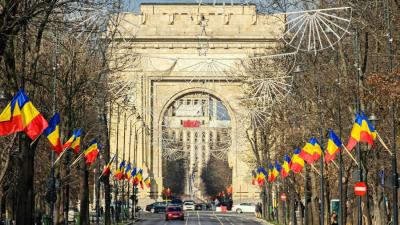José Manuel Candón is a retired Marine lieutenant. A specialist in explosive ordnance disposal, he was one of the survivors of the accidental explosion at the Army Engineer Academy on 24 February 2011, in which five soldiers and Marines were killed and three others injured. Candón had to leave active service due to the serious after-effects of the explosion and now works with the NGO “Help to Ukraine” to clear mines in Ukraine.
Álvaro Peñas: How do you get involved with “Help to Ukraine”?
José Manuel Candón: After I left the army because of the consequences of the accident, I started a hard fight with the administration, which is still going on, because 13 years later there is still no court decision and no compensation has been paid. Then I met a Ciudadanos MP, Miguel Gutiérrez, who was on the Defence Committee. Gutiérrez left politics when Ciudadanos lost its representation and dedicated himself to humanitarian work from the first day of the invasion. One of the most pressing problems of the war is that of landmines and, for that reason, he contacted me.
When Miguel asked me to collaborate, I thought it was a good way to help people and also by doing something I like because it was related to my work. So I accepted and we started working.
With a war that actually started in 2014, I imagine the landmine problem in Ukraine is huge.
The problem is not only mines, it is also explosive ordnance, such as ammunition, rockets or missiles, that have not detonated or are in warehouses or depots. To date, more than 800,000 explosives have been cleared and approximately 150,000 square kilometres of land and 15,000 square kilometres of water are contaminated with explosives. The problem is that a mine or explosive device is very cheap to mass-produce, costing between 10 and 15 dollars, but removing one costs between 800 and 1,000 dollars. Right now, Ukraine is the most heavily mined country in the world, and there can be no thorough demining until the war is over because humanitarian NGOs are also being targeted by Russian forces. Only a few days ago, the building housing the headquarters of the Swiss NGO providing humanitarian aid in Kharkiv was bombed. That is why, for the duration of the war, our task is to train Ukrainian personnel.
Aid in this field has several aspects. One is what everyone knows as humanitarian demining, which is the clearing of areas of land; then there is education, risk education for civilians; and finally, there is training. In Ukraine, non-combat demining is carried out by the fire brigade, and we went to their school to train them. Their main limitation is that they have very few specialists and we are preparing courses to improve this situation.
From what you tell me, there is a lot to be done, but with the needs of the front, are there resources for this task?
The priority is the frontline, of course. Everything we have done so far has been altruistic and depends on humanitarian aid. Our idea is to start in March or April 2025, because yes, the priority is the war, but Ukraine is the breadbasket of Europe and it is necessary to return to “normality” as soon as possible: liberate land that is contaminated with explosives, improve infrastructure, repair roads, build schools and so on. For example, to date 400 schools have been destroyed. Before many of these things can be done, the whole area needs to be cleared of explosives. And that requires trained personnel.
Are civilian casualties from mines frequent?
When we were there, they told us that they had a problem with Soviet-era submunitions that continue to appear from time to time, and then there is modern ammunition, which in many cases has a parachute or can sometimes look like a toy because of its shape and is a danger to children. That is why risk education in schools, hospitals, etc. is so important. There have been cases of people trying to remove a rocket that had not detonated for months in order to free a specific place, and this is the cause of many accidents. There are also cases of explosives being booby-trapped in supposedly safe areas, and the emergency chief of Jmelnitski, whom we met on a visit to his school, is in a very serious condition because of a booby-trap explosion on the road.
This is normal in war zones. For example, when I was in Sarajevo every day we received an alert, and the fact is that, no matter how much you raise people’s awareness, the need to survive is more important than safety. There are accidents, and there will be many more because, over time, people become relaxed and confident.
How have you seen the situation in Ukraine and how do Ukrainians coexist with the war?
You have to distinguish between two areas. Those that are close to the front and those that are not. In Kyiv, despite the fact that there are alarms almost every night and they are attacked with rockets, life doesn’t stop, and in Lviv you hardly notice the war. I was struck by the number of soldiers I saw on the streets and the patriotism of the Ukrainians. They are ready to defend every inch of ground and everything is full of flags, pride and support for the soldiers. Much more than what we see in the United States. I was impressed because I have experienced what it is like to be in the military in Spain, to have an accident and only have the support of your family and your colleagues. I was also struck by the number of wounded and amputees, which is where you see the consequences of the war, especially as some still have no prostheses and use old crutches to get around. Today there are 50,000 amputees. But Ukraine is going on, even though 90% of the resources are for the war, and the cities don’t stop. Kyiv can’t stop, people go about their normal daily lives, you can go to a pizzeria or have a coffee.
This has been used by many Russian propagandists as proof that there is, in fact, no war in Ukraine.
It is that in war the military go to the front and the civilians stay behind and go about their lives. The military when he goes to the front does not fight for himself, he fights for those he is leaving behind and for the freedom of those behind him. The country has to move forward so as not to end up in ruin and the Ukrainian people need to move forward and that means going about their daily lives. Those at the front are defending the freedom of those at the rear, and if the enemy should succeed in curtailing the freedom of the rear, then it would be winning.
And what do you think, when here in Spain, there are many who blame Ukraine for the war?
I have always been very clear about who is the invader and who is the invaded, and that is why I have decided to help. I hold a strong position in favour of the Ukrainian people because they have been crushed and crushed again and again. War is cruel, but today, with the tactical systems in place, you can’t bomb a hospital. This is not a failure, there is a clear intentionality.
That is why it is so important for me to be able to help and collaborate with the Ukrainians. Making 50,000 risk education leaflets and distributing them in the most polluted areas, or giving awareness-raising classes in schools, is a very nice job. It’s the satisfaction of a job well done, because in the end you have to take a step forward, and very few people do.
Read also
Is a European Strategy Possible?
At the end of July I attended a talk with Balasz Orbán, political director of Hungarian Prime Minister Viktor Orbán and author of the book “The Hungarian way of strategy”. The talk covered a number of topics that can certainly help to understand the political strategy of Viktor Orbán’s government and the reason why he is supported by the majority of Hungarian people.
Álvaro Peñas
Country Report: Spain & Portugal, March 2023
The political news in Spain in March was marked, much to the chagrin of the mainstream media, by the motion of censure presented by VOX against Pedro Sánchez’s government.
Álvaro Peñas
The Romanian Crossroads
In a world where every day we wake up to news that turns upside down what we took for granted, as we are seeing in Syria or South Korea, Romania has made its mark with the surprising result of the first round of the presidential elections.










Comments (0)